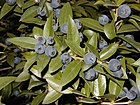Note: This is a project under development. The articles on this wiki are just being initiated and broadly incomplete. You can Help creating new pages.
Myrtus
Myrtus is a genus of flowering plants in the family Myrtaceae described by Linnaeus in 1753.
Contents
- 1 Uses
- 2 Parts Used
- 3 Chemical Composition
- 4 Common names
- 5 Properties
- 6 Habit
- 7 Identification
- 8 List of Ayurvedic medicine in which the herb is used
- 9 Where to get the saplings
- 10 Mode of Propagation
- 11 How to plant/cultivate
- 12 Commonly seen growing in areas
- 13 Photo Gallery
- 14 References
- 15 External Links
Uses
Respiratory conditions, Skin problems, Boosted immune system, Hormone balance, Cancer, Kidney health, Cognitive abilities, Heart health, Diabetes.
Parts Used
Chemical Composition
The GC/MS analysis of the essential oil revealed 17 compounds. Myrtenyl acetate (20.75%), 1,8-cineol (16.55%), α-pinene (15.59%), linalool (13.30%), limonene (8.94%), linalyl acetate (3.67%), geranyl acetate (2.99%), and α-terpineol (2.88%) were the major components[1]
Common names
| Language | Common name |
|---|---|
| Kannada | murukulu gida |
| Hindi | Baragasha, Murad |
| Malayalam | |
| Tamil | cativam, kulinaval |
| Telugu | chitti jama |
| Marathi | NA |
| Gujarathi | NA |
| Punjabi | NA |
| Kashmiri | NA |
| Sanskrit | Gandhamalati |
| English | True Myrtle, Common myrtle |
Properties
Reference: Dravya - Substance, Rasa - Taste, Guna - Qualities, Veerya - Potency, Vipaka - Post-digesion effect, Karma - Pharmacological activity, Prabhava - Therepeutics.
Dravya
Rasa
Tikta (Bitter), Kashaya (Astringent)
Guna
Laghu (Light), Ruksha (Dry), Tikshna (Sharp)
Veerya
Ushna (Hot)
Vipaka
Katu (Pungent)
Karma
Kapha, Vata
Prabhava
Habit
Identification
Leaf
| Kind | Shape | Feature |
|---|---|---|
| Simple | Foliage Color (Spring) is Green |
Flower
| Type | Size | Color and composition | Stamen | More information |
|---|---|---|---|---|
| Unisexual | 2-4cm long | White | 5-20 | Flower Interest is Showy and Flowers are Fragrant |
Fruit
| Type | Size | Mass | Appearance | Seeds | More information |
|---|---|---|---|---|---|
| 7–10 mm | Fragrant Fruit is Fragrant | Fruit Color is Black | Single | {{{6}}} |
Other features
List of Ayurvedic medicine in which the herb is used
- Vishatinduka Taila as root juice extract
Where to get the saplings
Mode of Propagation
How to plant/cultivate
For the best results, plant myrtle outdoors in late spring in a well-drained, sheltered position. This gives it the best chance of establishing lots of root before winter weather sets in.[3]
Commonly seen growing in areas
Photo Gallery
References
External Links
- Ayurvedic Herbs known to be helpful to treat Respiratory conditions
- Ayurvedic Herbs known to be helpful to treat Skin problems
- Ayurvedic Herbs known to be helpful to treat Boosted immune system
- Ayurvedic Herbs known to be helpful to treat Hormone balance
- Ayurvedic Herbs known to be helpful to treat Cancer
- Ayurvedic Herbs known to be helpful to treat Kidney health
- Ayurvedic Herbs known to be helpful to treat Cognitive abilities
- Ayurvedic Herbs known to be helpful to treat Heart health
- Ayurvedic Herbs known to be helpful to treat Diabetes
- Herbs with Dried folaige used in medicine
- Herbs with Flowers used in medicine
- Herbs with common name in Kannada
- Herbs with common name in Hindi
- Herbs with common name in Tamil
- Herbs with common name in Telugu
- Herbs with common name in Sanskrit
- Herbs with common name in English
- Habit - Herb
- Index of Plants which can be propagated by Seeds
- Index of Plants which can be propagated by Cuttings
- Herbs that are commonly seen in the region of Mediterranean region
- Herbs
- Ayurvedic herbs that don't have seed photos






